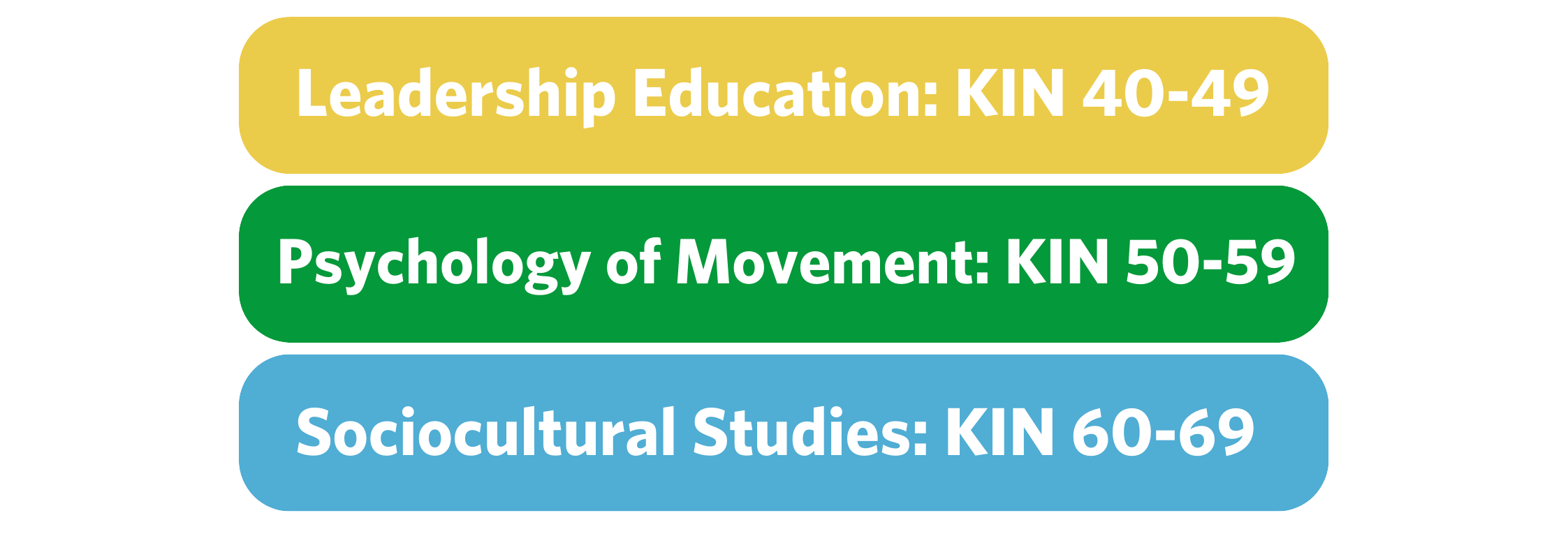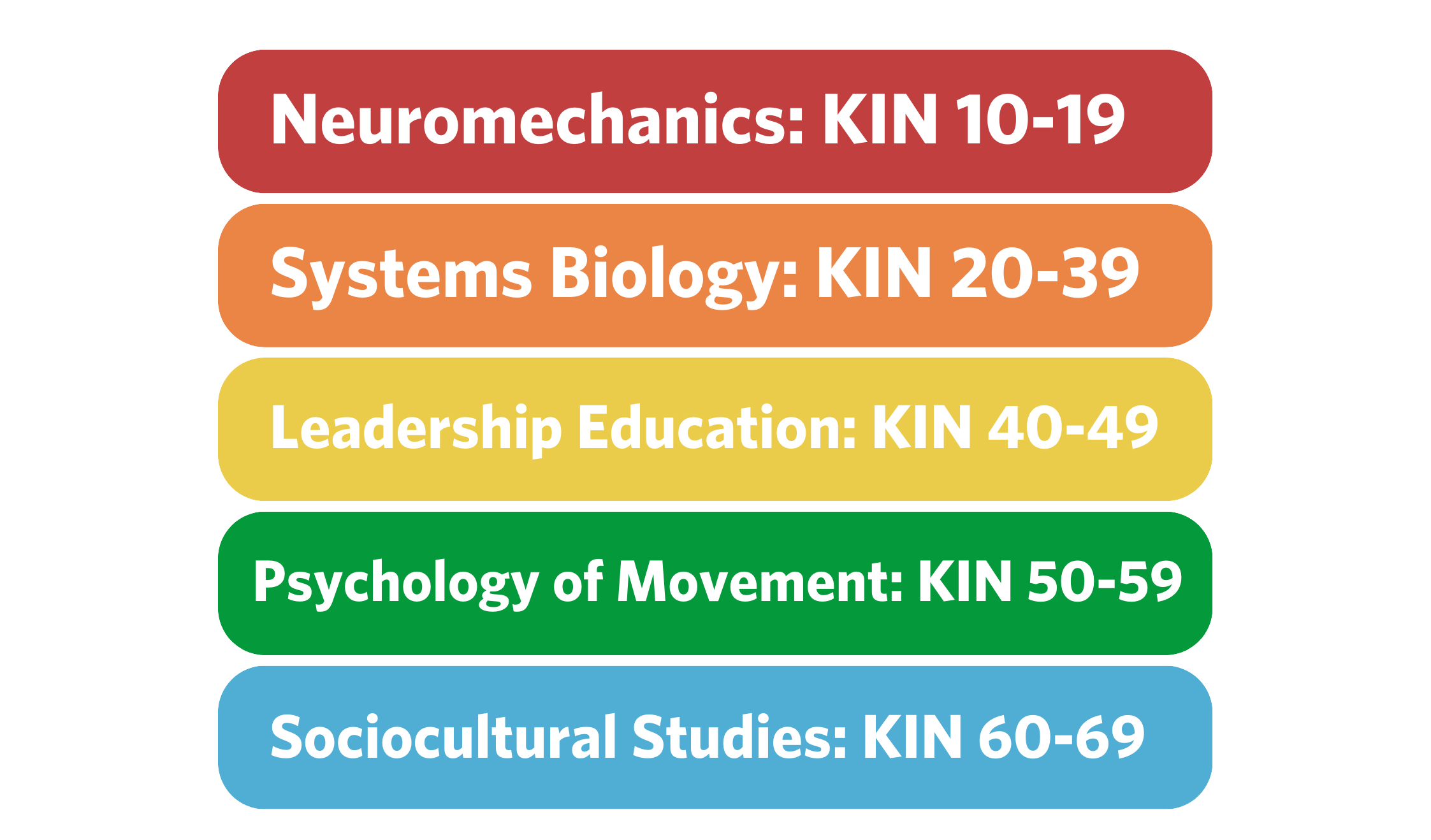Upper-level coursework lets you customize your academic journey based on your unique interests and goals. In addition to meeting the requirements of your chosen stream, you can enhance your academic experience by choosing complementary upper-level KIN electives. These electives act as a canvas for exploring your academic passions, enabling you to delve deeper into the subjects that interest you the most.
Year 3
Promotion to Year 3 standing is based on the successful completion of 48 credits in total. BKIN students are strongly encouraged to complete all 200-level core KIN requirements in the Winter session of their second year.
In your third year, you should aim to plan a balanced schedule that includes a mix of stream-specific courses, upper-level KIN electives (indicated as ‘UL’), as well as general electives (KIN or non-KIN) balanced across both terms. The proposed course sequence below provides a template that students who aspire to graduate in four years can use to structure their third year.
Stream-Specific KIN
| UL KIN | Stream Specific | 3 credits |
| UL KIN | Stream Specific | 3 credits |
| UL KIN | Stream Specific | 3 credits |
KIN Electives
| UL KIN | Non-Stream Specific | 3 credits |
| UL KIN | Non-Stream Specific | 3 credits |
| UL KIN | Non-Stream Specific | 3 credits |
*Upper-level KIN electives can include:
- Advanced Seminars
- Work-integrated Learning
- Directed Studies & Research
General Electives
| Elective | Any course, any level | 3 credits |
| Elective | Any course, any level | 3 credits |
| Elective | Any course, any level | 3 credits |
| Elective | Any course, any level | 3 credits |
*Minimum of 48 credits at the upper-level required throughout Year 3 and Year 4.
Year 4
Promotion to Year 4 standing is based on the successful completion of 78 credits in total and the completion of the Writing Requirement with WRDS 150 (or an approved equivalent).
As your approach your final year, you should pay close attention to the specific credit requirements for stream-specific courses (21 credits), upper-level KIN electives (15 credits), and general elective requirements.
Stream-Specific KIN
| UL KIN | Stream Specific | 3 credits |
| UL KIN | Stream Specific | 3 credits |
| UL KIN | Stream Specific | 3 credits |
| UL KIN | Stream Specific | 3 credits |
KIN Electives
| UL KIN | Non-Stream Specific | 3 credits |
| UL KIN | Non-Stream Specific | 3 credits |
*Upper-level KIN electives can include:
- Advanced Seminars
- Work-integrated Learning
- Directed Studies & Research
General Electives
| Elective | Any course, any level | 3 credits |
| Elective | Any course, any level | 3 credits |
| Elective | Any course, any level | 3 credits |
| Elective | Any course, any level | 3 credits |
*Minimum of 48 credits at the upper-level required throughout Year 3 and Year 4.
Understanding KIN Course Codes
The last two digits of each KIN course code indicates the thematic area. BKIN students must complete a minimum of 48 credits at the upper-level (300/400-level) throughout Year 3 and Year 4. Registering in the right set of KIN courses at the upper-level is easier when you understand how KIN course codes are numbered.
Of the 48 credits required upper-level credits:
36 credits must be upper-level KIN courses:
- 21 credits of stream-specific KIN courses coming from five thematic areas: Neuromechanics, Systems Biology, Leadership Education, Psychology of Movement, and Sociocultural Studies.
- 15 credits of upper-level KIN electives fulfilled by additional coursework in any of the five thematic areas, or Advanced Seminars, Work-Integrated Learning, Directed Studies, or Undergraduate Research Experience courses.
12 credits must be upper-level electives in KIN or non-KIN coursework, bringing the total to 48 upper-level credits in needed to graduate.

Stream-Specific KIN Courses
Streams within the BKIN degree program are pathways allowing you to focus your studies on specific areas of interest within the field of Kinesiology. Over the course of your 3rd and 4th year, you must complete a minimum of 21 credits of upper-level lecture/lab coursework from specific thematic areas. These stream-specific courses should be spread out across both years, alongside other electives.
Visit the Course Outlines page for specific courses in each of the streams below.
Neuromechanical and Physiological Sciences
The NPSC stream focuses on understanding the complexities of human anatomy and the processes that control motion. This exploration covers physiological, neural, mechanical, and behavioral elements, highlighting how they interact. Moreover, the curriculum examines how factors such as physical activity, aging, and disease affect these elements. To fulfill the NPSC stream requirements, students must complete 21 credits of upper-level KIN courses in the following thematic areas:

Social and Behavioural Sciences
The SBSC stream emphasizes investigating the psychosocial, historical, and cultural aspects of sport, physical activity, and health behavior. This analysis extends to comprehending their effects on both individuals and societies. To complete the SBSC stream requirements, students must complete 21 credits of upper-level KIN courses in the following thematic areas:

Multidisciplinary Science
The MDSC stream offers flexibility in designing your own program of study through course selections from each of the 5 thematic areas. This approach enables the creation of a comprehensive, cross-disciplinary curriculum. To complete the MDSC stream requirements, students must complete a combination of 21 credits of upper-level KIN courses: including 2 courses in 3 out of the 5 themes offered, as well as 1 course from either of the remaining 2 lists:

Upper-Level KIN Electives
In addition to fulfilling the 21 credits required for your chosen stream, you must also complete an additional 15 credits of general upper-level KIN electives. While you can opt to take additional lecture/lab courses from any of the 5 thematic areas above, we encourage you to consider exploring some of the dynamic, applied, and research-focused coursework options below. These enriching opportunities will not only enhance your BKIN degree but also help you develop invaluable skills and experiences for your future endeavors.



